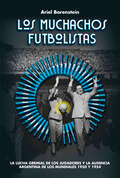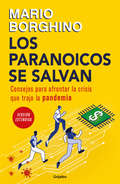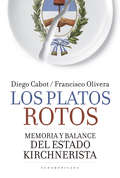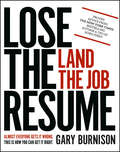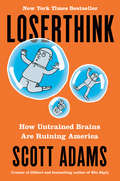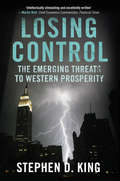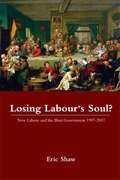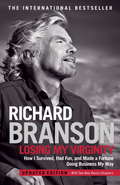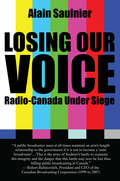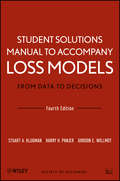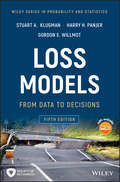- Table View
- List View
Los hábitos cotidianos de las personas que triunfan: ¿Eres búho, alondra o colibrí?
by Begoña del Pueyo¿Sabías que la eficiencia del reloj biológico aumenta con la rutina, que la siesta puede ser beneficiosa siempre que no supere la media hora, que el ejercicio físico y la meditación estimulan las endorfinas que nos hacen sentir felicidad, o que puedes ganar más dinero, pero que es imposible recuperar el tiempo? ¿Eres búho, alondra o colibrí? Las alondras son madrugadoras y rinden más al mediodía. Los búhos, por el contrario, son productivos de noche. Y los colibríes son quienes mejor se ajustan al ciclo de noche y día. ¿Te gustaría ser alondra, como a la mayoría de las personas que desean triunfar, pero te tienes que conformar con comportarte como un colibrí, igual que el 70% de los españoles? ¿O perteneces al 20% de los búhos? Los testimonios de profesionales de referencia y de especialistas recogidos en este libro permiten arrojar luz sobre los hábitos de nuestra vida cotidiana que influyen en la posibilidad de alcanzar nuestros objetivos. Y con extraordinaria amenidad, salpicado de anécdotas de famosos empresarios, políticos, banqueros, deportistas y artistas, el libro ofrece las claves para optimizar la gestión del tiempo y el rendimiento. «¿Qué es bueno para ti? ¿Qué necesitas para tener éxito? Puede que ya lo sepas o puede que este libro te ayude a descubrirlo.» Del prólogo de Nathalie Picquot, directora general de Twitter España
Los magnates de la prensa
by María Olivia MonckebergCada día son más evidentes los perjuicios que para la sociedad y su progreso tiene la extremada concentración de los medios de comunicación en Chile. Al terminar la dictadura, los consorcios que habían sido sólidos puntales de apoyo del gobierno militar dominaron la escena. El dejar hacer al «mercado» en este terreno ha contribuido a consolidar a estos grupos dueños de los principales medios escritos. Entretanto la radio, hasta hace poco considerada plural y diversa, también muestra síntomas de concentración en grandes cadenas. La televisión, por su parte, ha pasado a ser fundamentalmente comercial. Los restringidos espacios para otras inquietudes se han visto copados por la «farándula», los reality shows, la crónica roja y una versión audiovisual de sensacionalismo periodístico que inunda las pantallas. En esta exhaustiva investigación, María Olivia Mönckeberg, Premio Nacional de Periodismo 2009, da cuenta de las enormes influencias de los magnates de la prensa en Chile ?entre ellos Agustín Edwards, Álvaro Saieh y Sebastián Piñera? y descubre el cerco ideológico-financiero que han generado a su alrededor. El acceso social a la información, el rol fiscalizador de la prensa y la propia libertad de expresión y opinión de los ciudadanos se ven condicionados por este imperio que cada vez parece adquirir más fuerza.
Los muchachos futbolistas: La lucha gremial de los jugadores y la ausencia Argentina de los mundiales 1950 y 1954
by Ariel BorensteinCon entrevistas y una gran investigación en medios de la época, textos historiográficos y clásicos del cine argentino, Borenstein reconstruye la historia de los desencuentros entre el país peronista y la principal pasión popular: el fútbol. Un episodio central es el de la huelga que entre 1948 y 1949 protagonizaron entre otros el ya legendario Pedernera y el ascendente Di Stéfano. Los muchachos futbolistas cuenta la historia de una década de paradójicos desencuentros entre el primer peronismo y la principal pasión popular de Argentina. La de los años en que los jugadores consolidaron un proceso de profesionalización que se había iniciado en los 30 y se sindicalizaron. Clave en esta época fue la huelga de futbolistas que -entre 1948 y 1949- encabezó un ícono como Adolfo Pedernera -el de La Máquina de River-, tras la cual un centenar de jugadores se fueron al exilio, provocando una sangría en las filas locales mientras el fútbol brasileño despegaba y el colombiano vivía una era dorada gracias a la participación de los argentinos que recalaron allí. ¿Por qué, a pesar de lo que significaba el fútbol para la sociedad de la época y de la activa promoción del deporte que se hizo desde el gobierno, Argentina no participó en los mundiales de Brasil 1950 ni de Suiza 1954? ¿Cómo se explica que Alfredo Di Stéfano, el primer crack global, el más genuino antecesor de Messi y Maradona, haya hecho su carrera en Colombia y en España y ya no volviera a jugar en su tierra? Ariel Borenstein indaga en las circunstancias de este atípico momento en el que faltó sincronización entre dos de los fenómenos que definen al país, tendiendo inevitablemente un puente entre nuestros "muchachos", los que nos volvieron a ilusionar, y aquellos primeros, inolvidables y combativos "muchachos" del tango y la marcha peronista.
Los paranoicos se salvan (Versión extendida): Consejos para afrontar la crisis que trajo la pandemia
by Mario BorghinoDESCUBRE LOS MEJORES NEGOCIOS DIGITALES PARA NUEVOS EMPRENDEDORES EN UN MUNDO DE ALTA INCERTIDUMBRE. Tras la aparición del SARS-CoV-2, la incertidumbre se ha vuelto tan extraordinaria y el nivel de volatilidad es tal que es indispensable repensar por completo los modelos estratégicos tradicionales y aquellas ideas que nos pueden ayudar a controlar lo incontrolable. Ante esta "nueva normalidad", las dificultades potenciales son tan evidentes que resulta necesario integrar en tu negocio, en tu trabajo o en tu vida personal una actitud preventiva, casi paranoica. El nuevo lema es "piensa mal y te irá bien". Es hora de instalarte en un estado de alerta ante amenazas inéditas. Visualizar el presente con esta actitud te permitirá ganar tiempo y usar de la mejor manera tu inteligencia empresarial. Se trata de anticiparse como un mecanismo de defensa. Una actitud preventiva también es una actitud proactiva desolución de problemas. Descubre junto a Mario Borghino cómo convertir esta actitud en un método de éxito para los negocios y superar la crisis que ha dejado la pandemia. INCLUYE CONSEJOS PARA ADAPTARSE A LAS TENDENCIAS ACTUALES: DESDE EL HOME OFFICE HASTA LA VENTA EN LÍNEA.
Los paranoicos se salvan: Consejos para afrontar la crisis que trajo la pandemia
by Mario BorghinoConsejos esenciales para superar la crisis económica causada por el coronavirus. A lo largo de su carrera profesional, Mario Borghino ha enseñado a los ejecutivos y emprendedores a enfrentar los cambios y a tomar decisiones con cierto nivel de incertidumbre, teniendo en cuenta que un plan B siempre es necesario por si falla el original. Pero esta vez, tras la aparición del virus conocido como SARS-CoV-2, la incertidumbre se ha vuelto extraordinaria y el nivel de volatilidad es tal que es necesario repensar por completo los modelos estratégicos tradicionales y revisar cuáles ideas nos pueden ayudar a controlar lo incontrolable. Ante esta o "nueva normalidad", las dificultades potenciales son tan evidentes que será necesario integrar en tu negocio, en tu trabajo o en tu vida personal, una actitud preventiva, casi paranoica, como el camino más aconsejable. Podrás decir que un paranoico es una persona con untrastorno mental o un trastorno de personalidad, pero no siempre es así. El nuevo lema es "piensa mal y te irá bien". Es hora de instalarte mentalmente en un sitio que te ponga en estado de alerta ante amenazas y dificultades inéditas. Visualizar la situación presente con esta actitud te permitirá ganar tiempo y usar de la mejor manera tu inteligencia lógica y cuantitativa. Se trata de anticiparse como un mecanismo de defensa. Una actitud preventiva también es una actitud proactiva de solución de problemas. Descubre aquí cómo convertir esta actitud en un método de éxito para los negocios, que te permita además identificar cuáles son los mercados que tendrán más probabilidades de salir adelante en medio de la crisis que ha dejado la pandemia.
Los platos rotos: Memoria y balance del Estado kirchnerista
by Diego Cabot, Francisco Olivera¿Cómo es que el kirchnerismo pasó de gestionar un Estado moderno, que mejoró la vida de amplios sectores sociales, a otro sobredimensionado, caro, ineficiente y corrupto? Desde el fútbol hasta los servicios públicos, no quedó sector sin intervención estatal: el agua, el gas, el petróleo, la electricidad, las rutas y autopistas y las telecomunicaciones se volvieron botines políticos y fuentes de empleo para militantes oficialistas.En el transcurso de una década, la Argentina sufrió la pérdida del autoabastecimiento energético, de la diversidad de su producción agropecuaria y de la inversión en infraestructura; a esto se le sumó la fuga de capitales por 80.000 millones de dólares. Al final del ciclo, el déficit fiscal del 4% del PBI se asemeja al de los peores momentos de la convertibilidad. La inflación, el default y el cepo cambiario agravaron la recesión y aumentaron la pobreza y el desempleo.Desde los pasillos y oficinas donde se ejerce el poder político y económico, Diego Cabot y Francisco Olivera reconstruyen con información inédita un relato hipnótico que permite comprender a fondo cómo se construyó el "Modelo" y cuáles fueron sus paradójicos resultados.
Los problemas de la banca (Flash Ensayo #Volumen)
by Jonathan McMillanUn texto que explica en qué consiste el pánico financiero, el talón de Aquiles de la banca. McMillan se centra en definir una de las amenazas que más preocupan al sistema bancario actual: el pánico financiero. El sistema bancario es enormemente frágil, ya que se basa en el crédito y en el dinero ficticio. Si hay demasiada gente que quiere retirar el dinero de sus bancos, estos entran en quiebra, dando lugar al famoso «corralito». Una sola estampida bancaria puede provocar una reacción en cadena y desembocar en un colapso total del sistema financiero, como ya se vio durante el Crac del 29 que dio paso a la Gran Depresión en Estados Unidos. McMillan explica dos formas de prevenir los pánicos bancarios: el fondo de garantía de depósitos y los Bancos Centrales, como el Sistema de la Reserva Federal en Estados Unidos, que ayudan a regularizar y poner límites a la banca. Jonathan McMillan, pseudónimo de dos autores que conocen de primera mano el funcionamiento de la banca, protagonizó un auténtico fenómeno de autopublicación. El fin de la banca, el libro desde donde se extrae este texto, identifica la raíz de los problemas actuales y presenta una solución original y realista.
Los secretos del financiamiento empresarial
by Boomy Tokan Patricia Fierro CarriónMuchos negocios nuevos se convencen a sí mismos de que el motivo por el cual es difícil conseguir el dinero que necesitan es la escasez. No hay nada más alejado de la verdad. El problema no es la escasez, sino la falta de conocimientos detallados sobre cómo funcionan los préstamos, las donaciones y los financistas de capitales de riesgo, entre otros. Hay métodos ingeniosos para recaudar fondos empresariales. El objetivo de este libro es ayudar a empresas nuevas y recién establecidoa a comprender los aspectos complejos de conseguir dinero, estar posicionados para potenciar las ideas y atraer el financiamiento requerido.
Los siete principios del Camino de Santiago: Lecciones de liderazgo en un caminata por España
by Victor PrinceInicia tu viaje, recorre el camino, forja al peregrino en líder. El Camino de Santiago se extiende en dirección oeste a través del norte de España. En la Edad Media fue una de las rutas cristianas de peregrinaje más importantes. Este libro está estructurado alrededor de los siete valores que los peregrinos deben abrazar mientras recorren el Camino. Usa todas las virtudes y las historias del Camino para deducir de ellas unas lecciones para los líderes. Se trata de un viaje de líderes como ningún otro. Cada año, centenares de miles de peregrinos recorren accidentados paisajes rurales y atraviesan poblaciones medievales con el fin de reflexionar, poner a prueba su fuerza de voluntad y unirse a una comunidad de desconocidos en una misión compartida. Dicho en pocas palabras, es el campo de entrenamiento ideal para un liderazgo auténtico. Victor Prince, una vez aceptado el reto de recorrer el Camino, comenzó su aventura como una persona resuelta, centrada en su trabajo y altamente competitiva, y lo terminó como otra persona muy diferente: más equilibrada, más solidaria y más presente en el momento actual. Este libro te preparará para enfrentar la vida con el corazón de un peregrino, la decisión de un caminante y la visión de un líder.
Lose Your Mind: The Path to Creative Invincibility
by Josh PaisThe personal development industry doesn't want you to read this book.They tell you to control your thoughts. Conquer your fear. Train your mindset.They&’re wrong.The truth? Listening to your mind is what&’s been keeping you stuck.Josh Pais was raised in a world most of us can&’t imagine. His father was a physicist who worked with Einstein. His mother was a poet and painter. He grew up immersed in the clash between logic and creativity, precision and chaos. That collision led to a breakthrough.For decades, Josh has worked with award-winning actors, world-class entrepreneurs, thriving artists, and high performers in every field to stop battling their minds and start using every emotion, every doubt, every nerve—everything they feel—to unlock unstoppable presence.You&’ve seen him for years —Ray Donovan, Joker, The Sopranos, A Beautiful Mind, SVU, Sex and the City. He even played Raphael in the original Teenage Mutant Ninja Turtles movie. But behind the scenes, he&’s been teaching a method so powerful it rewires how you show up under pressure.Inside Lose Your Mind, you&’ll learn:The 4-step system to dissolve hesitation and activate peak presence Why confidence isn&’t what you think—and why chasing it keeps you stuckHow to master spontaneity—so you can command attention in any roomThe hidden advantage of nervousness (if you know how to use it)How to access creative invincibility—no matter what&’s happening in your headThe secret to moving through life with total authenticity and easeIf you&’ve ever felt trapped in your head, paralyzed by overthinking, or convinced you&’re not ready, this book is your way out.Because that voice in your head? It&’s not the problem. Listening to it is.Lose Your Mind. Gain the freedom, power, and creative prowess you crave.
Lose the Resume, Land the Job
by Gary BurnisonLose the resume and land that coveted job Gone are the days of polishing up your resume and sending it out at random. At every level today, you need to “lose the resume” in order to land the right job. In other words, you have to learn to tell a story about yourself that speaks to your competencies, purpose, passion, and values. Lose the Resume, Land the Job shares the new rules of engagement: How you must think, act, and present yourself so you can win. Based on inner exploration drawn from the IP of the world's largest executive recruiting firm, the book gleans insights and stories (the good, the bad, and sometimes the ugly) from Korn Ferry recruiters across the globe who work with thousands of candidates each day. It helps you gain a deeper perspective on who you are, what you’re passionate about, the cultures in which you fit, the kind of bosses you should work for, and where you can bring the most value to organizations. • Includes assessments, questionnaires, and other tools • Candid advice for young professionals through middle managers • Offers trusted guidance from the same firm that has shown 8 million executives how to achieve their career goals, and that puts a professional in new job every three minutes • Helps you build a plan for the future so you can contribute more to the next employer Getting a job and, more importantly, building a career has never been more complex. Lose the Resume, Land the Job helps you score the positions that align with your passion and match your attributes — and that will put you on a trajectory toward bigger and better things.
Lose the Weight of the World
by Charles BlairMedical science tells us stress is a killer. Our daily routines tell us the same thing. For the burned-out and weary comes a book that highlights the modern person's spiritual malnourishment. Aimed at developing the spiritually and emotionally fit man and woman, this timely book focuses on purifying our thoughts, firming up Bible knowledge, and shedding a harmful self-image. An uncompromising look at the things that nag all of us, Lose the Weight of the World promises to trim the fat of our souls.
Loserthink: How Untrained Brains Are Ruining America
by Scott AdamsFrom the creator of Dilbert and author of Win Bigly, a guide to spotting and avoiding loserthink: sneaky mental habits trapping victims in their own bubbles of reality. If you've been on social media lately, or turned on your TV, you may have noticed a lot of dumb ideas floating around."We know when history will repeat and when it won't.""We can tell the difference between evidence and coincidences.""The simplest explanation is usually true."Wrong, wrong, and dangerous!If we're not careful, loserthink would have us believe that every Trump supporter is a bigoted racist, addicts should be responsible for fixing the opioid epidemic, and that your relationship fell apart simply because you chewed with your mouth open.Even the smartest people can slip into loserthink's seductive grasp. This book will teach you how to spot and avoid it--and will give you scripts to respond when hollow arguments are being brandished against you, whether by well-intentioned friends, strangers on the internet, or political pundits. You'll also learn how to spot the underlying causes of loserthink, like the inability to get ego out of your decisions, thinking with words instead of reasons, failing to imagine alternative explanations, and making too much of coincidences.Your bubble of reality doesn't have to be a prison. This book will show you how to break free--and, what's more, to be among the most perceptive and respected thinkers in every conversation.
Losing Control
by Stephen D. KingAs the economic giants of Asia and elsewhere have awakened, Western leaders have increasingly struggled to maintain economic stability. The international financial crisis that began in 2007 is but one result of the emerging nations' increased gravitational pull. In this vividly written and compellingly argued book, Stephen D. King, the global chief economist at HSBC, one of the largest banking groups in the world, suggests that the decades ahead will see a major redistribution of wealth and power across the globe that will force consumers in the United States and Europe to stop living beyond their means. The tide of money washing in from emerging nations has already fuelled the recent property bubble in the West, while new patterns of trade have left the West increasingly dependent on risky financial services. Unless things change drastically, King argues, the increasing power of emerging markets, when coupled with poor internal regulation and an increasingly anachronistic system of global governance, will result in greater instability and income inequality, accompanied by the risk of a major dollar decline. And as Western populations age and emerging economies develop further, the social and political consequences may be alarming to citizens who have grown accustomed to living in prosperity.
Losing Control?: Sovereignty in the Age of Globalization (Leonard Hastings Schoff Lectures)
by Saskia SassenWhat determines the flow of labor and capital in this new global information economy? Who has the capacity to coordinate this new system, to create some measure of order? What happens to territoriality and sovereignty, two fundamental principles of the modern state? And who gains rights and who loses rights? Losing Control? examines the rise of private transnational legal codes and supranational institutions, such as the World Trade Organization and universal human rights covenants, and shows that though sovereignty remains an important feature of the international system, it is no longer confined to the nation-state. Other actors gain rights and a kind of sovereignty by setting some of the rules that used to be within the exclusive domain of states. Saskia Sassen tracks the emergence and the making of the transformations that mark our world today, among which is the partial denationalizing of national territory. Two arenas in particular stand out in the new spatial and economic order by their capacity to set their own rules: the global capital market and the series of codes and institutions that have mushroomed into an international human rights regime. As Sassen shows, these two quasi-legal realms now have the power and legitimacy to demand action and accountability from national governments, with the ironic twist that both depend upon the state to enforce their goals. From the economic policy shifts forced by the Mexico debt crisis to the recurring battles over immigration and refugees around the world, Losing Control? incisively analyzes the events that have radically altered the landscape of governance in an era of increasing globalization.
Losing Ground in the Employment Challenge: The Case of Paraguay
by Albert BerryMost developing countries face significant and sometimes dramatic challenges in generating stable jobs that provide reasonable incomes and decent working conditions. For developing countries that have undergone lengthy periods of economic stagnation, these challenges are especially acute, and popular dissatisfaction correspondingly marked.Paraguay is a case in point. It is unlikely that any "employment policy" could lead to a major improvement in the quality of labor market outcomes unless designed and implemented in a sophisticated and coherent way. Such an approach has been infrequent in developing countries in general, and especially so in those that, like Paraguay, also suffer severe institutional weaknesses of governance. Paraguay's past failure in employment creation is mainly the result of a number of structural weaknesses described in this volume. Its current crisis is also the accumulated legacy of over a quarter century of economic stagnation and political failure fl owing from those weaknesses. The new reformist administration of President Fernando Lugo has raised hopes that the future might be better than the past.This study aims to contribute to improved policy making by analyzing the source of the problems and providing policy recommendations. The chapters describe the potential contribution of various policy areas in the face of a dauntingly negative track record and identify a number of steps that have to be taken if success is to be achieved. They put into perspective the reforms that have been undertaken to date by the country's previous administration.Paraguay's experience offers insight into the problems faced by other developing countries in today's global economy. The central message is that policy improvements must be made in a number of areas and implemented in a coordinated fashion for there to be any reasonable hope of success.
Losing Labour's Soul?: New Labour and the Blair Government 1997-2007
by Eric ShawBased on extensive original research and interviews with a wide variety of key players, this is a compelling assessment of the Labour Party in power. Beginning with a detailed account of the development of New Labour, including the ideological tensions within the party, Eric Shaw provides a sophisticated analysis of the Labour Government during an unprecedented period of power. Offering the most detailed examination yet published of the actual performance of the party in several key social and economic policy areas, Losing Labour’s Soul? will be of enormous interest to students of British politics, labour history and party politics.
Losing My Virginity: How I've Survived, Had Fun, and Made a Fortune Doing Business My Way
by Richard Branson"Oh, screw it, let's do it." That's the philosophy that has allowed Richard Branson, in slightly more than twenty-five years, to spawn so many successful ventures. From the airline business (Virgin Atlantic Airways), to music (Virgin Records and V2), to cola (Virgin Cola), to retail (Virgin Megastores), and nearly a hundred others, ranging from financial services to bridal wear, Branson has a track record second to none. Losing My Virginity is the unusual, frequently outrageous autobiography of one of the great business geniuses of our time. When Richard Branson started his first business, he and his friends decided that "since we're complete virgins at business, let's call it just that: Virgin." Since then, Branson has written his own "rules" for success, creating a group of companies with a global presence, but no central headquarters, no management hierarchy, and minimal bureaucracy. Many of Richard Branson's companies--airlines, retailing, and cola are good examples--were started in the face of entrenched competition. The experts said, "Don't do it." But Branson found golden opportunities in markets in which customers have been ripped off or underserved, where confusion reigns, and the competition is complacent. And in this stressed-out, overworked age, Richard Branson gives us a new model: a dynamic, hardworking, successful entrepreneur who lives life to the fullest. Family, friends, fun, and adventure are equally important as business in Branson's life. Losing My Virginity is a portrait of a productive, sane, balanced life, filled with rich and colorful stories: Crash-landing his hot-air balloon in the Algerian desert, yet remaining determined to have another go at being the first to circle the globe Signing the Sex Pistols, Janet Jackson, the Rolling Stones, Boy George, and Phil Collins Fighting back when British Airways took on Virgin Atlantic and successfully suing this pillar of the British business establishment Swimming two miles to safety during a violent storm off the coast of Mexico Selling Virgin Records to save Virgin Atlantic Staging a rescue flight into Baghdad before the start of the Gulf War ... And much more. Losing My Virginity is the ultimate tale of personal and business survival from a man who combines the business prowess of Bill Gates and the promotional instincts of P. T. Barnum.
Losing My Virginity: How I've Survived, Had Fun, and Made a Fortune Doing Business My Way
by Richard Branson"Oh, screw it, let's do it."That's the philosophy that has allowed Richard Branson, in slightly more than twenty-five years, to spawn so many successful ventures. From the airline business (Virgin Atlantic Airways), to music (Virgin Records and V2), to cola (Virgin Cola), to retail (Virgin Megastores), and nearly a hundred others, ranging from financial services to bridal wear, Branson has a track record second to none.Losing My Virginity is the unusual, frequently outrageous autobiography of one of the great business geniuses of our time. When Richard Branson started his first business, he and his friends decided that "since we're complete virgins at business, let's call it just that: Virgin." Since then, Branson has written his own "rules" for success, creating a group of companies with a global presence, but no central headquarters, no management hierarchy, and minimal bureaucracy.Many of Richard Branson's companies--airlines, retailing, and cola are good examples--were started in the face of entrenched competition. The experts said, "Don't do it." But Branson found golden opportunities in markets in which customers have been ripped off or underserved, where confusion reigns, and the competition is complacent. And in this stressed-out, overworked age, Richard Branson gives us a new model: a dynamic, hardworking, successful entrepreneur who lives life to the fullest. Family, friends, fun, and adventure are equally important as business in Branson's life. Losing My Virginity is a portrait of a productive, sane, balanced life, filled with rich and colorful stories: Crash-landing his hot-air balloon in the Algerian desert, yet remaining determined to have another go at being the first to circle the globeSigning the Sex Pistols, Janet Jackson, the Rolling Stones, Boy George, and Phil CollinsFighting back when British Airways took on Virgin Atlantic and successfully suing this pillar of the British business establishmentSwimming two miles to safety during a violent storm off the coast of MexicoSelling Virgin Records to save Virgin AtlanticStaging a rescue flight into Baghdad before the start of the Gulf War . . .And much more. Losing My Virginity is the ultimate tale of personal and business survival from a man who combines the business prowess of Bill Gates and the promotional instincts of P. T. Barnum.Also available in the UK from Virgin Publishing, and in Canada from General Publishing,From the Hardcover edition.
Losing Our Voice: Radio-Canada Under Siege
by Alain Saulnier Pauline CoutureThe inside story of decades of government interference in the work of our national public broadcaster, CBC/Radio-Canada. Is there a quiet campaign to hamstring and silence the CBC? In Losing Our Voice Alain Saulnier, long-time head of news and public affairs at Radio-Canada, documents the decades of political interference that have jeopardized the very existence of one of Canada’s most important cultural institutions. For French-speaking Canadians, with limited options in their own language, the national broadcaster is all the more important. But tensions surrounding national unity and identity have exacerbated the tendency of federal politicians to meddle in CBC/Radio-Canada’s content and management. Saulnier takes us behind the scenes as these tensions play out, and culminate in the punitive Harper budget cuts.
Loslassen für Führungskräfte: Meine Mitarbeiter schaffen das
by Markus JotzoVon Managementbuch.de und der German Speakers Association (GSA) ausgezeichnet mit dem Preis "Trainerbuch des Jahres 2013"! Ob es um Teams geht, einzelne Abteilungen oder das ganze Unternehmen: Wer mit seiner Mannschaft erfolgreich sein will, muss loslassen - loslassen - Mitarbeitern Großes zutrauen - delegieren. Denn nur wer seine Mitarbeiter fordert und sie auch machen lässt, kann das Beste aus ihnen herausholen. Und nur wenn jeder sein Bestes gibt, kann das Unternehmen sein volles Potenzial entfalten. Eigenverantwortliche und kreative Mitarbeiter, die den Laden praktisch alleine schmeißen, während der Chef sich aus dem operativen Geschäft zurückzieht und sich voll und ganz auf seine Führungsaufgaben konzentriert: Das ist der Traum einer jeden Führungskraft. Doch wie genau geht das? In der Realität scheitern die guten Vorsätze allzu oft an der Umsetzung. Markus Jotzo weiß aus eigener Erfahrung, wie Mitarbeiter zu Mitunternehmern werden. In diesem Ratgeber zeigt er, dass Mitarbeiterverantwortung kein Luftschloss bleiben muss. Schritt für Schritt erklärt er, wie Führungskräfte ihre Leute in die Verantwortung ziehen, und sich dadurch Freiräume schaffen. Hart an der Praxis vermittelt dieses Buch handfestes Werkzeug und bewährte Strategien, die sich Tag für Tag mit Leichtigkeit direkt umsetzen lassen. Wer die Tipps befolgt, beschäftigt sich immer weniger mit Feuerlöschen und immer mehr mit den langfristig wichtigen Dingen. Die 2., erweiterte Auflage widmet sich der Coaching-Aufgabe von Führungskräften. Es reicht nicht allein, loszulassen und Tätigkeiten an Mitarbeiter abzugeben. Führungskräfte müssen diese auch dazu befähigen, diese Tätigkeiten zu bewältigen.
Loss Control Auditing: A Guide for Conducting Fire, Safety, and Security Audits (Occupational Safety & Health Guide Series)
by E. Scott DunlapLoss Control Auditing: A Guide for Conducting Fire, Safety, and Security Audits is a one-stop resource for both developing and executing a loss control audit program. This fully updated second edition addresses loss control auditing from the perspectives of workplace safety, physical security, and fire risks. It focuses on the three core areas of an audit: documentation review, physical inspection, and employee interviews, and presents a three-phase model – pre-audit, audit, and post-audit activities – which can be used for all three core areas. This new edition benefits from the addition of auditing and system measurement material as promulgated in ISO 45001 and ANSI/ASSP Z10 standards and the Occupational Safety and Health Administration’s Recommended Practices for Safety and Health Programs. It offers an expanded discussion of the application of auditing to the field of emergency management and new text explaining how leading and lagging measures can be used in the auditing process during assessment as well as in the post-audit evaluation. Subsidiary organizations and their integration into the auditing process, such as the areas of contractor management and temporary worker safety are covered in detail. The book discusses the integration of qualitative and quantitative measures in an effort to arrive at a more holistic scoring mechanism to assess organizational performance. In all, the depth of material presented in this thorough book showcases how to develop and execute a loss control management system audit program to a high quality. An ideal read for industry professionals, students, and postgraduates in the fields of fire service, loss prevention, and safety management.
Loss Coverage: Why Insurance Works Better with Some Adverse Selection
by Guy ThomasMost academic and policy commentary represents adverse selection as a severe problem in insurance, which should always be deprecated, avoided or minimised. This book gives a contrary view. It details the exaggeration of adverse selection in insurers' rhetoric and insurance economics, and presents evidence that in many insurance markets, adverse selection is weaker than most commentators suggest. A novel arithmetical argument shows that from a public policy perspective, 'weak' adverse selection can be a good thing. This is because a degree of adverse selection is needed to maximise 'loss coverage', the expected fraction of the population's losses which is compensated by insurance. This book will be valuable for those interested in public policy arguments about insurance and discrimination: academics (in economics, law and social policy), policymakers, actuaries, underwriters, disability activists, geneticists and other medical professionals.
Loss Models
by Harry H. Panjer Stuart A. Klugman Gordon E. WillmotPraise for the Third Edition"This book provides in-depth coverage of modelling techniques used throughout many branches of actuarial science. . . . The exceptional high standard of this book has made it a pleasure to read." --Annals of Actuarial ScienceNewly organized to focus exclusively on material tested in the Society of Actuaries' Exam C and the Casualty Actuarial Society's Exam 4, Loss Models: From Data to Decisions, Fourth Edition continues to supply actuaries with a practical approach to the key concepts and techniques needed on the job. With updated material and extensive examples, the book successfully provides the essential methods for using available data to construct models for the frequency and severity of future adverse outcomes.The book continues to equip readers with the tools needed for the construction and analysis of mathematical models that describe the process by which funds flow into and out of an insurance system. Focusing on the loss process, the authors explore key quantitative techniques including random variables, basic distributional quantities, and the recursive method, and discuss techniques for classifying and creating distributions. Parametric, non-parametric, and Bayesian estimation methods are thoroughly covered along with advice for choosing an appropriate model.New features of this Fourth Edition include:Expanded discussion of working with large data sets, now including more practical elements of constructing decrement tablesAdded coverage of methods for simulating several special situationsAn updated presentation of Bayesian estimation, outlining conjugate prior distributions and the linear exponential family as well as related computational issuesThroughout the book, numerous examples showcase the real-world applications of the presented concepts, with an emphasis on calculations and spreadsheet implementation. A wealth of new exercises taken from previous Exam C/4 exams allows readers to test their comprehension of the material, and a related FTP site features the book's data sets.Loss Models, Fourth Edition is an indispensable resource for students and aspiring actuaries who are preparing to take the SOA and CAS examinations. The book is also a valuable reference for professional actuaries, actuarial students, and anyone who works with loss and risk models.To explore our additional offerings in actuarial exam preparation visit www.wiley.com/go/c4actuarial .
Loss Models: From Data to Decisions (Wiley Series in Probability and Statistics #977)
by Harry H. Panjer Stuart A. Klugman Gordon E. WillmotA guide that provides in-depth coverage of modeling techniques used throughout many branches of actuarial science, revised and updated Now in its fifth edition, Loss Models: From Data to Decisions puts the focus on material tested in the Society of Actuaries (SOA) newly revised Exams STAM (Short-Term Actuarial Mathematics) and LTAM (Long-Term Actuarial Mathematics). Updated to reflect these exam changes, this vital resource offers actuaries, and those aspiring to the profession, a practical approach to the concepts and techniques needed to succeed in the profession. The techniques are also valuable for anyone who uses loss data to build models for assessing risks of any kind. Loss Models contains a wealth of examples that highlight the real-world applications of the concepts presented, and puts the emphasis on calculations and spreadsheet implementation. With a focus on the loss process, the book reviews the essential quantitative techniques such as random variables, basic distributional quantities, and the recursive method, and discusses techniques for classifying and creating distributions. Parametric, non-parametric, and Bayesian estimation methods are thoroughly covered. In addition, the authors offer practical advice for choosing an appropriate model. This important text: • Presents a revised and updated edition of the classic guide for actuaries that aligns with newly introduced Exams STAM and LTAM • Contains a wealth of exercises taken from previous exams • Includes fresh and additional content related to the material required by the Society of Actuaries (SOA) and the Canadian Institute of Actuaries (CIA) • Offers a solutions manual available for further insight, and all the data sets and supplemental material are posted on a companion site Written for students and aspiring actuaries who are preparing to take the SOA examinations, Loss Models offers an essential guide to the concepts and techniques of actuarial science.


